Cleaning
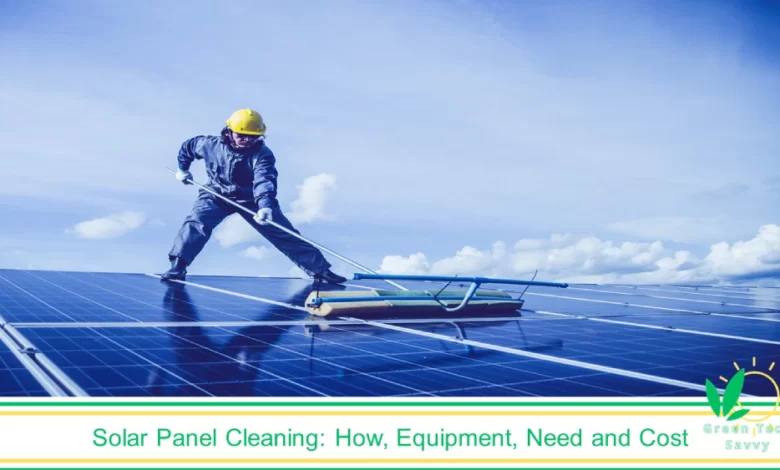
What to Know About Solar Panels Cleaning?
Solar panels cleaning removes dirt, dust, pollen, debris, and other contaminants from the surface of solar photovoltaic panels to maintain their optimal efficiency.
Solar panels’ is affected by pollen by 15% in Spring. Average annual energy losses caused by pollen reach 10%. When pollen from cypress, juniper, oak, and pine trees accumulates on the surface of solar panels, it obstruct sunlight and reduce the panels’ efficiency in converting sunlight into electricity. Dirt and dust decrease solar panels’ efficiency by 30%, according to The Sandia National Laboratories’ study.
Solar panels cleaning from dirt, pollen and dust has 7 steps including (preparing solar panel cleaning equipment and tools, safety considerations, applying cleaning solution). The 7 steps are done using simple methods, or automated methods.
Cleaning ways include washing with water, using cleaning solutions (vinegar), or employing an automatic solar panel cleaner (robots, drones).
Solar panel cleaning methods require equipment and tools, including (solar panel cleaning solutions, safety equipment, solar panel soap). Solar panel cleaning kit make DIY solar panel cleaning easier.
Solar panels need to be cleaned regularly (once or twice a year), whether you choose DIY solar panel cleaning, or contacting solar panel cleaning service. Cleaning protects panels from accumulation of dirt that could hinder the absorption of sunlight and reduce the overall performance of the solar panel system by 7%, according to the National Renewable Energy Laboratory.
Regular solar panels cleaning, even when it costs money, maximize energy output, protect from damage, adhere to warranty terms, adapt to local conditions, and ensure long-term durability.
Solar panels cleaning cost depends on the panels’ number and type. For residential systems, cleaning cost is approximately 500- 700 dollars. Commercial solar panel cleaning cost ranges from a few hundred to over a thousand dollars per visit. There are differences between commercial solar systems and residential solar cleaning, in terms of cost and complexity, due to differences in terms of panels’ numbers and sizes. Thus, solar panels cleaning automatically is a way to save money in the long term.
This Article answers the following questions: How to Clean Solar Panels? What is The Best Way to Clean a Solar Panel? What is Solar Panel Cleaning Equipment? What is a Solar Panel Cleaning Kit? Do solar panels need to be cleaned? How Often to Clean Solar Panels? How Much Does it Cost to Clean Solar Panels? How Much Commercial Solar Panel Cleaning Cost? What are the Differences Between Commercial Solar Systems and Residential Solar Systems? How do you clean solar panels automatically?
How to Clean Solar Panels?
To Clean Solar Panels yourself (DIY solar panel cleaning), follow 7 simple steps and instructions. How to clean solar panels step by step is showed in the following picture.
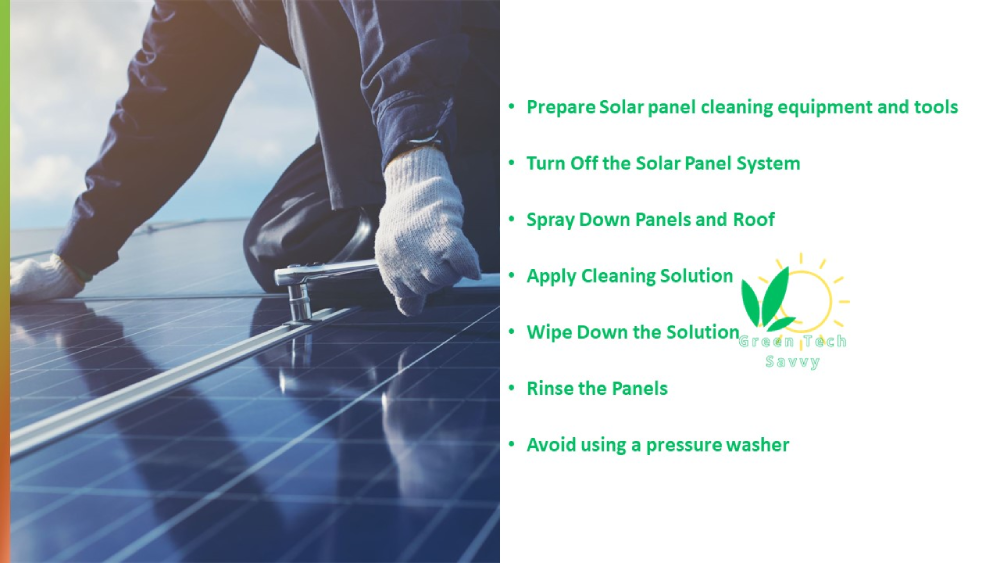
How to clean solar panels in 7 steps is explained in the following list.
- Prepare Solar panel cleaning equipment and tools. Ensure that all necessary tools and materials are readily available. Set up the extension ladder securely, confirming safe access to the roof. Prepare the cleaning solution in the gallon sprinkler for solar panel cleaning.
- Turn Off the Solar Panel System. You need to turn off solar panels to clean. Thus Prioritizing safety and the protection of the solar panel system by turning off the power.
- Spray Down Panels and Roof. Use a garden hose with a spray attachment to rinse the solar panels and adjacent roofs, eliminating loose debris or dirt.
- Apply Cleaning Solution. Prepare the cleaning solution in the gallon sprinkler for solar panel cleaning; apply a thin layer of the cleaning solution to a small section of a solar panel. Allow the solution to penetrate the dirt for a few minutes, ensuring it doesn’t dry out.
- Wipe Down the Solution. Employ a soft brush or sponge to gently wipe down the section of the solar panel treated with the cleaning solution. Wrap a towel around the squeegee attached to the extension pole if needed. Maintain a safe posture on the ladder with flat feet and avoid leaning over.
- Rinse the Panels. Use the hose with the spray attachment to rinse off the panels again. Subsequently, use the squeegee to dry the panels before reactivating the power to the solar panel system.
- Avoid using a pressure washer. as it cause damage to the glass on solar panels. Do not use cold water for washing solar panels when they are hot panels to prevent potential cracking. Avoid using harsh chemicals, such as bleach, as they harm both the solar panels.
To clean solar panels, there are several ways (solar panel cleaning robot, cleaning solar panels with vinegar, a solar panel cleaning service)
What is The Best Way to Clean Solar Panels?
There are 5 main ways to clean solar panels are (using cleaning robots, using vinegar, contacting solar panel cleaning service, using soapy water, using a soft cloth or brush). The best 5 ways to clean solar panels is shown in the following picture.
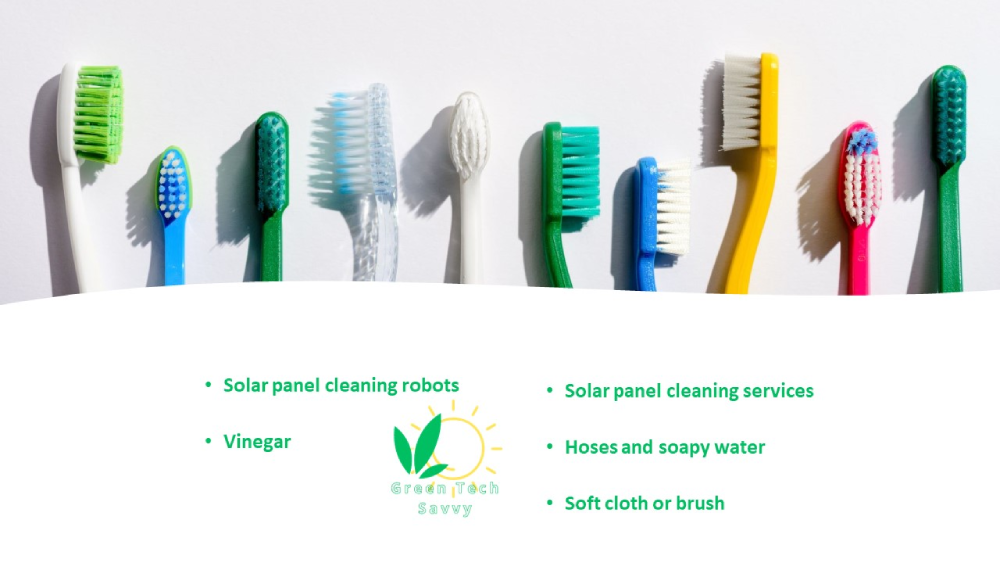
Choose the best way to clean solar panels from the following list of 5 ways.
- Using a solar panel cleaning robot. A solar panel cleaning robot is a specialized automated device designed to clean and maintain solar panels. These robots are equipped with various mechanisms and technologies to navigate, clean, and ensure the optimal performance of solar panels. The robot is equipped with sensors such as cameras, infrared sensors, or ultrasonic sensors to detect the presence and location of solar panels. Cleaning robots have rotating brushes, wipers, or other cleaning mechanisms to remove dust, dirt, and debris from the solar panels. A solar panel cleaning robot is remotely monitored and controlled.
- Cleaning solar panels with vinegar. Vinegar effectively maintains the cleanliness of metal and crystal objects like solar panels. For cleaning solar panels with vinegar, Create a cleaning solution by diluting ¼ cup of vinegar with two cups of water and half a teaspoon of liquid detergent or non-abrasive soap. Pour this mixture into a spray bottle for an efficient cleaning solution.
- Using a solar panel cleaning service. A solar panel cleaning service is a professional cleaning solution offered by companies or individuals specializing in the maintenance and cleanliness of solar panel installations. This service involves using specialized tools, equipment, and cleaning techniques to remove dust, dirt, debris, and other contaminants from the surface of solar panels.
- Using a hose and soapy water. Washing is an excellent solar panel cleaner, prioritizing the avoidance of scratching. To avoid any damage, maintain low pressure when spraying the panels.
- Employing a soft cloth or brush. Along with mild solar panel soap, is a protective measure from scratching the panel’s surface. Any soft fabric without abrasive elements works well. A squeegee with a plastic blade enhance the smooth cleaning of the solar panel’s surface. Opting for a soft fabric that doesn’t leave any residue is an excellent choice for an effective cleaning process.
What is Solar Panel Cleaning Equipment?
Solar panel cleaning equipment is various tools and devices designed to effectively clean and maintain solar panels. Solar panel cleaning equipment and solar panel cleaning tools are shown in the following figure.
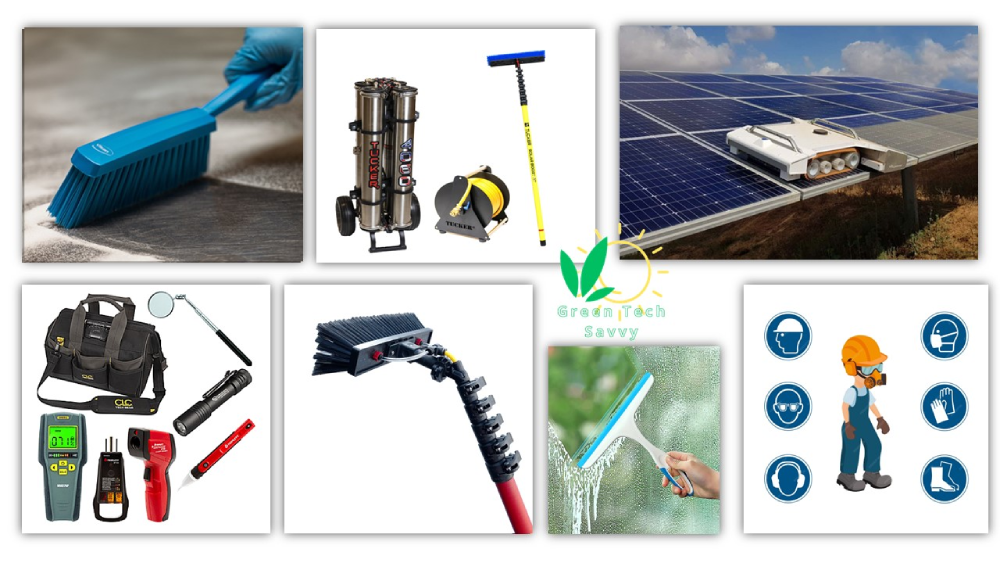
Solar panel cleaning equipment and solar panel cleaning tools are listed below.
- Soft-bristle brushes. Gentle brushes explicitly designed for solar panels help remove dust, dirt, and debris without causing damage to the panels.
- Water-fed poles. These extendable poles allow cleaning professionals to reach solar panels that are difficult to access. They often come with a brush attachment and a water supply system to clean panels efficiently.
- Deionized water systems. Water purification systems that remove minerals and impurities from water, preventing residue and streaks on the solar panels after cleaning.
- Solar panel cleaning solutions. Mild detergents or a specialized cleaning solution formulated to break down and remove stubborn stains, bird droppings, and other contaminants from solar panels.
- Squeegees and wipers. Used to wipe away water and cleaning solution from the solar panels, ensuring a streak-free finish.
- Blowers or air compressors. These devices blow away loose debris and dust from the surface of solar panels.
- Drones or robotic cleaners. Advanced drones equipped with cleaning mechanisms or robotic systems designed for an automatic solar panel cleaner is employed for large-scale installations.
- Safety equipment. Personal protective equipment (PPE) such as safety harnesses, gloves, and non-slip footwear to ensure the safety of personnel while cleaning solar panels, especially on rooftops.
- Inspection tools. Instruments like thermal imaging cameras or infrared thermometers to identify areas of the solar panels that require additional attention due to dirt buildup or malfunctions.
- Solar panels soap. Use a soap designed for solar panels, as the highly concentrated additive should isn’t a filmy soap
Solar panel cleaning equipment and solar panel cleaning tools come in one box as a solar panel cleaning kit.
What is a Solar Panel Cleaning Kit?
Solar panel cleaning kit is a set of specialized tools and equipment designed to clean and maintain solar panels. Solar panel cleaning kit include soft-bristle brushes, water-fed poles, deionized water systems, cleaning solutions, squeegees, and instructions for proper use. Solar panel cleaning kit is intended to facilitate the effective removal of dust, dirt, debris, and other contaminants from solar panels, ensuring optimal sunlight absorption and the continued efficiency of the solar panel system.
A solar panel cleaning kit is shown in the following picture.
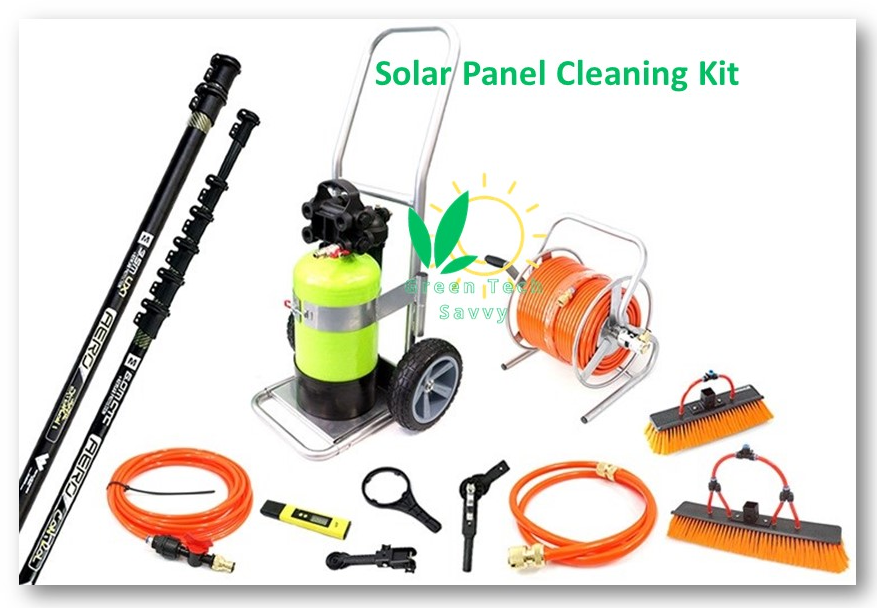
Do Solar Panels Need to be Cleaned?
Yes, solar panels need to be cleaned regularly. Solar panels need cleaning because their efficiency is reduced by 30% due to dust, soot, and other particulates, according to the National Renewable Energy Laboratory.
The are 4 reasons that make solar panels need to be cleaned. That 4 reasons are explained in the following list.
- Enhancing Efficiency and Energy Output. Any accumulation of dirt, dust, bird droppings, or other debris on the panels obstruct sunlight absorption, reducing the efficiency of the solar cells. Uncleaned solar panels generate less electricity, impacting the overall performance of the solar panel system.
- Protection from Permanent Damage. Accumulated dirt, if left unaddressed, causes long-term damage to the solar panels, necessitating expensive repairs or replacements.
- upholdding Warranty. Many solar panel manufacturers require regular maintenance, including cleaning, to uphold the warranty terms.
- Regulating temperature. Accumulated debris trap heat, leading to an increase in panel temperature and potentially affecting performance. Elevated temperatures reduce the efficiency of solar panels and contribute to wear and tear over time.
To know how often do you need to clean your solar panels, you must consider 3 main factors (geographic location, landscaping, pitch of your roof).
How Often to Clean Solar Panels?
Cleaning solar panels once or twice a year is a sensible rule. However, 3 specific factors influence the ideal cleaning schedule. The 3 factors influence solar panel cleaning need are explained in this list.
- Geographic Location. Natural rinsing suffice for cleaning solar panels in regions with regular rainfall. Conversely, in dry climates, more frequent manual cleaning is necessary.
- Landscaping. Solar panels are installed in areas with unobstructed sunlight. more frequent cleaning is necessary, if nearby trees exist, pollen, leaves, branches, and other debris accumulate on the panels.
- Pitch of the Roof. Solar panels on roofs with steeper pitches tend to require less frequent cleaning than those on roofs with lower pitches.
Considering these factors help determine a more tailored and effective cleaning schedule for maintaining the optimal performance of your solar panel system. The 3 factors influence how often to clean solar panels are shown in the following picture.
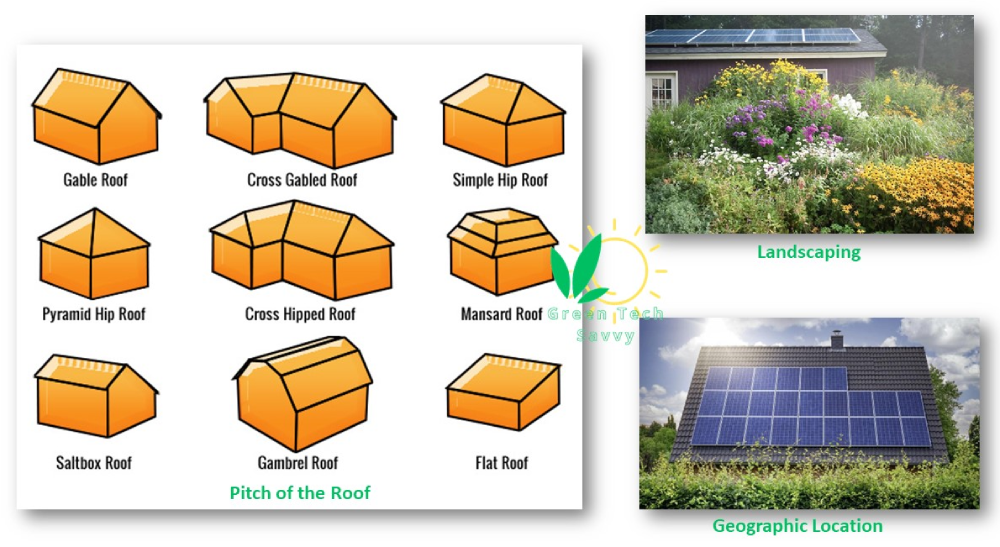
How Much Does it Cost to Clean Solar Panels?
The average cost to clean solar panels is 8-25 dollars per panel. The cost of cleaning solar panels depends on the panels’ number and type. The cost of cleaning Rigid or Flexible Panels is 150- 300 dollars per visit. The annual basic cleaning price is approximately 500- 700 dollars.
Commercial solar panel cleaning cost is higher due to the differences between commercial and home Solar systems in terms of dimensions and number of solar panels.
How Much Commercial Solar Panel Cleaning Cost?
Commercial solar panel cleaning cost, on average, range from a few hundred to over a thousand dollars per visit. Commercial solar panel cleaning cost varies based on factors such as the size of the installation, location, and specific cleaning requirements.
Commercial solar panel cleaning is the professional service of cleaning and maintaining solar panels in commercial-scale installations. Commercial solar panel cleaning process involves using specialized tools, equipment, and cleaning techniques to remove dust, dirt, debris, and other contaminants from the surface of solar panels. The primary goal of cleaning commercial panels is to optimize the efficiency and performance of the solar panels, ensuring maximum sunlight absorption and electricity generation in large-scale commercial solar energy systems. There are differences between commercial solar systems and residential solar in terms of cost and complexity, thus you should consider cleaning solar panels automatically to save money.
What are the Differences Between Commercial Solar Systems and Residential Solar Systems?
Cleaning considerations for commercial and residential solar systems differ in several aspects due to the scale and specific requirements of each setting. industrial solar systems are typically larger and more complex than residential ones. Cleaning such systems requires specialized equipment and expertise due to their scale. Commercial solar installations are located on large rooftops, ground-mounted fields, or even on multiple buildings. Accessing and cleaning these areas is challenging and requires specialized tools or machinery. Professional cleaners use water-fed pole systems, drones, or other advanced tools to clean large arrays efficiently. Commercial installations need to adhere to specific regulations and environmental standards. Cleaning processes must align with these regulations to avoid any legal or environmental issues.
On the other hand, to answer the question of what the are differences between commercial solar systems and residential solar systems, residential solar systems are smaller and more accessible than their commercial counterparts. Home panels are cleaned using common household tools such as a hose, soft brush, and mild detergent. House solar panels require less frequent cleaning compared to commercial ones. Homeowners are involved in the maintenance of their solar systems. Regular visual inspections help identify the need for cleaning or other maintenance tasks.
How Do You Clean Solar Panels Automatically?
To clean commercial solar panels automatically, design a system that utilizes robotic mechanisms or advanced drone technology. This reduces the long-term cost. One approach is to create a robotic device equipped with soft brushes or cleaning pads that move across the surface of the solar panels. This robotic system is programmed to follow a predefined path, ensuring thorough coverage of the entire panel array.
Implementing sensors and innovative technology enhance the efficiency of the cleaning process. For example, integrate sensors to detect the level of dirt or dust on the panels, triggering the cleaning mechanism when a certain threshold is reached. This automation optimize the cleaning schedule based on real-time conditions.